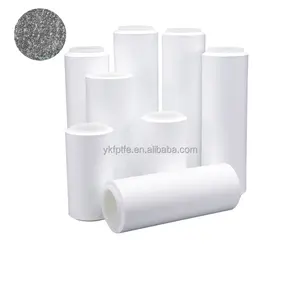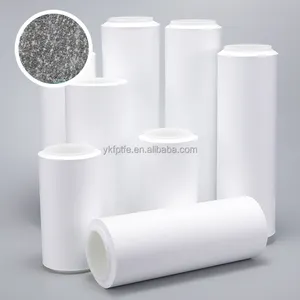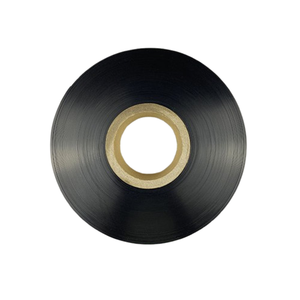
All categories
Featured selections
Trade Assurance
Buyer Central
Help Center
Get the app
Become a supplier

(1024 products available)
























































PTFE film has various types, each serving specific industrial and commercial requirements. The following are the most desired and widely used types:
Standard Black PTFE Film
Usually manufactured in thicknesses ranging from 0.05mm to 1mm, the standard black PTFE film is a universally applicable type. It works at temperatures ranging from -73 to 260 degrees Celsius. This film, recognized for its durability and flexibility, has numerous applications in electrical insulation, mechanical components, and chemical resistance.
Expanded PTFE (ePTFE) Film
Significantly different from the standard PTFE film, the expanded PTFE film is porous and provides a distinct flexibility structure. It is commonly used in filtration mediums, medical applications, and sealing tapes. This expanded film is also non-stick and highly resistant to chemical variations.
PTFE Coated Fiberglass Cloth
This cloth combines the strength of fiberglass with the non-stick PTFE coating. It provides a very durable surface that resists high levels of temperature and various chemicals. Usually, this material is applied for industrial conveyor belts, release sheets, and insulation in many applications.
PTFE Heat Shrink Tubing
This tubing allows the wrapping of components with PTFE film that can be heat-shrunk to fit tightly around substrates. Often used for insulation and protection of wires, cables, and other electronic components, it provides excellent thermal resistance and chemical protection.
PTFE Film for Medical Applications
PTFE films usually undergo sterilization processes, making them suitable for medical devices and implants. Flexible and resistant to extreme levels of temperature, this film is highly biologically inert; therefore, it does not react with body tissues and fluids.
Adhesive PTFE Film
This type of film comes with a pressure-sensitive adhesive backing. It sticks to surfaces easily and is often used in applications where a non-stick surface is required. This could include molds, machine parts, and other components prone to sticking.
PTFE Teflon film is widely applicable with buyers in different types of industries. Its versatility and resistance to extreme temperatures, chemicals, and wear make it a universal solution for many industrial needs. The following are the top five desired applications:
Electrical Insulation
PTFE film contains excellent dielectric properties, making it fit for insulation in the electronics and electrical industry. It is used in the insulation of wires, capacitors, and circuit boards, where the ability to resist heat and chemical degradation is highly required. The black color in the film, besides aesthetics, additionally provides a light barrier that helps improve its effectiveness as insulation.
Industrial Sealing and Gaskets
In industries where extreme temperatures or aggressive chemical exposure is common, Black PTFE gaskets and seals perform excellently. Many users out there install this film in machinery, pumps, and flanges to prevent leakage of fluids or gases. Its density and flexibility also fill gaps and provide a tight seal under pressure effectively.
Release Agents in Molding Processes
Black PTFE Teflon film is often used to make release agents in molding processes where materials such as resin, metal, or rubber are given a shape. Its non-stick property ensures the molded material easily comes out of the mold without damage or distortion occurring. This feature makes it extremely valuable in industries such as automotive, aerospace, and manufacturing.
Machinery Component Coatings
PTFE film protects and augments the lifetime of components in machinery and equipment in many industries. It is commonly used in parts that undergo friction, like bearings, bushings, and sliders. Due to its low coefficient of friction, it reduces wear and tear, enhances efficiency, and minimizes maintenance needs in machinery.
Chemical Processing Equipment
PTFE Teflon film is extensively used in chemical processing industries, given its exceptional resistance to a variety of chemicals, solvents, and acids. The film coats tanks, pipes, and other equipment that handle corrosive substances. Thus it serves as a barrier that protects the equipment from degradation and extends its lifespan.
Physical Characteristics
Black PTFE Teflon film comes in different thicknesses, usually ranging from 0.05mm to 1mm. It is highly flexible and can be easily cut into customized shapes for different applications. The film's surface is smooth, fostering non-stick properties that prevent adhesion of various materials ranging from food to industrial metal surfaces.
Temperature Resistance
PTFE Teflon film is highly regarded for its ability to operate under extreme thermal levels. It performs excellently in a temperature range from -73 to 260 degrees Celsius. Hence, it is ideal for applications where exposure to heat and cold are crucial aspects, such as insulation and seals in machinery and aerospace components.
Chemical Resistance
PTFE, or Teflon, is often called “forever material” because it responds well to almost every chemical. Therefore, black PTFE Teflon film has a strong resistance to acids, bases, solvents, and other corrosive agents. This makes it a trusted choice for chemical processing, laboratory equipment, and industrial applications where chemical exposure is possibly recurrent.
Mechanical Properties
PTFE film boasts exceptional durability and wear resistance. It has a low coefficient of friction, which means surfaces coated with this film exhibit little to no resistance to sliding. This feature is advantageous for moving parts in machinery, as it minimizes friction and potential wear over time. In addition, PTFE films are dimensionally stable, meaning they retain their shape and size despite alterations in environmental conditions.
Ease of Application
The black PTFE Teflon film can easily bond with various surfaces such as metals and composites. This makes it a go-to option for coatings and customized parts in many industries. The film can be cut into specific shapes, making it fit effortlessly into distinct machines and equipment.
The black PTFE film presents numerous advantages to its buyers for a wide range of business applications. Today, several leveraging factor consideration makes the film stand out to its user in the market. They include properties like thickness, mechanical tolerance, and more.
Below are key several strategies in place when choosing the best PTFE film:
Film Thickness
PTFE films come in different thickness levels. For applications where flexibility and conformity are salient, then the thin films, usually around 0.05mm, would be more appropriate. In cases where mechanical strength, abrasion resistance, or chemical exposure are highly required, thicker films would do the job perfectly.
Temperature Range
PTFE films can operate under extreme temperatures. However, it is vital to check the specific temperature range of the film in use, as different applications require distinct operating temperatures. Generally, PTFE films maintain their properties easily in temperatures ranging from -73 to 260 degrees Celsius.
Release Properties
PTFE is famed for its exceptional non-stick properties. However, the degree of release can change based on surface texture and the kind of material in contact with the film. Those applications that require a high level of release should opt for a film with a smoother surface.
Chemical Resistance
PTFE, which is also referred to as Teflon, has strong resistance to many chemicals. Nonetheless, it is important to identify the specific need for chemicals in one’s industry and reconfirm they are among the list of PTFE-resistant chemicals. Doing the above acts as a harm reduction strategy that ensures the film does not degrade over time.
Mechanical Properties
For applications that involve moving parts or exposure to mechanical stress, one should select a high-density PTFE film for better durability. Also, the tensile strength and elongation properties of the film indicate how well it performs under mechanical stress.
Installation Guidelines
Buyers should ensure that before bonding or applying PTFE film on any surface, the surface is clean to remove any pollutants like oils, dust, and debris. They should then cut the film to the desired size or shape. When installing or applying, they should do it slowly to prevent air bubbles from forming. Proper handling during this stage further enhances the film's performance. Film can be heated slightly to increase adhesion when bonding with other materials.
Maintenance Tips
PTFE film surfaces should be cleaned daily to maintain and increase the film's Teflon lifespan. Buyers should use mild detergents with water or a suitable solvent to clean the surface. One has to avoid abrasive cleaners or materials, as they can scratch or damage the film's surface. When inspecting the film, they should look for signs of wear and tear and act accordingly to replace the film whenever it starts deteriorating.
Safety Measures
In cases where the film is used in areas subjected to extreme temperatures, buyers should ensure they monitor the temperature levels consistently. Also, if the film comes to contact with any hazardous chemicals, users should ensure they are aware of the potential of those chemicals to the film. Lastly, they should ensure the equipment or area where the film is put has proper safety precautions for any toxic or hazardous chemicals.
A1: For long-lasting effectiveness, the black PTFE Teflon film should be stored in a dry and cool area, free from direct sunlight. In addition, it should be kept away from any hazardous chemicals that could potentially degrade its properties.
A2: The film is generally non-recyclable. This is due to the chemical structure of PTFE, which makes it hard to break down with standard recycling processes. Nevertheless, some companies provide specialized programs for recycling industrial PTFE.
A3: To enhance bonding with other materials, users should consider using higher levels of adhesive or heat to the film. Before bonding, they should ensure the surface is clean. It further enhances the bond by using compatible adhesives specifically designed for challenging materials like PTFE.
A4: Even though PTFE exhibits unparalleled resistance to chemical attacks, it is still recommended for certain aggressive chemical agents like halogens at high temperatures or voltages, especially with active alkali metals. Such exposures can cause significant damage to the film.
A5: Yes, the film is applicable in medical devices like stents and grafts. Also, the film's biocompatibility and resistance to extreme temperatures and chemicals allow it to be used in such applications.